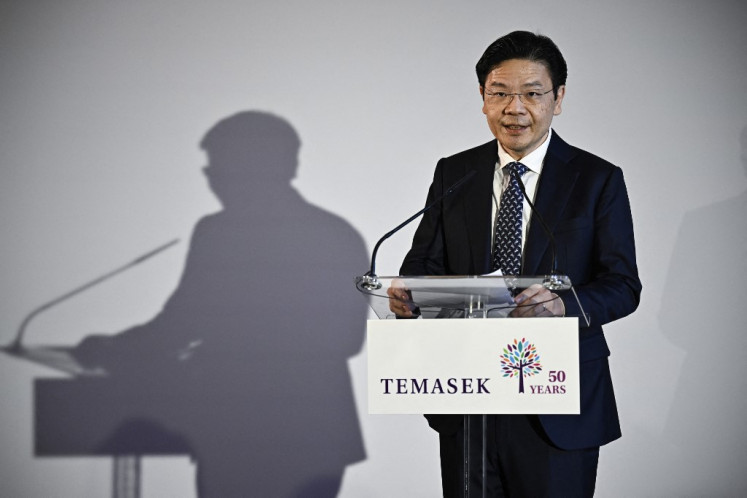Flip flop in Indonesia law making problem goes nuclear
To the extent it is true there is nothing that investors hate more than uncertainty, this has to be a very real problem for the government and Indonesia.
Change Size

T
he Constitutional Court’s recent decision that the Job Creation Law is unconstitutional but remains in effect for up to another two years, while the government tries to correct the procedural flaws that the Court has identified, can be viewed from a number of perspectives.
Some people will, no doubt, see the Court’s decision as embodying a very pragmatic and commendable approach that has saved the government and Indonesia from what would have otherwise been a public relations disaster if the Job Creation Law was to have been set aside immediately.
Other people may be inclined to praise the Court for its willingness to declare the Job Creation Law unconstitutional in the first place, believing that this confirms the Court’s independence and integrity.
I, however, is firmly of the view that Court’s decision “falls far short” on all accounts.
First, the government and Indonesia are unlikely to avoid a public relations disaster. It is important to remember that the Job Creation Law has been presented to the world as the government’s “signature” legislative initiative for the President’s second term and as making possible the rapid recovery of the Indonesian economy from the economic crisis brought on by the COVID-19 pandemic through encouraging a dramatic increase in foreign investment.
Accordingly, potential investors in Indonesia are surely going to find it simply incomprehensible that the government was so careless and, frankly, inept that it did not even bother to follow the well-established and well-known procedures for passing a law in Indonesia.
If this particular law was so important, it might reasonably have been expected the government would have been absolutely zealous in making sure nothing was overlooked in making it a reality and was then beyond successful challenge, at least in technical compliance terms, from the numerous groups who were vocal in their opposition to it. It is impossible to escape the conclusion that the government handled the passage of the Job Creation Law very poorly indeed.
Second and closely related to the first point, the Court’s decision will have confirmed the worst fears of investors (and of foreign investors in particular) that the problem of regulatory uncertainty in Indonesia is not going away anytime soon and, indeed, may be getting worse rather than better.
Commonly referred to (even, supposedly, by the President himself) as the “flip flop problem”, complaints about the number of regulations and other legislative instruments that are introduced in Indonesia without adequate industry consultation, only to be quickly amended, revoked or withdrawn once the inherent deficiencies of the same become apparent, has long been cited as one of the primary impediments to more foreign investment in Indonesia.
Investors will, inevitably, also worry that, in order to bring the Job Creation Law into line with the Constitution over the next two years, the government could be compelled to make various changes to the substance of the Job Creation Law and “water down” if not remove altogether some of the important reforms contained therein. Unfortunately, though, this will not be known for sure until such time as the Job Creation Law is made constitutionally sound from a procedural perspective.
To the extent it is true there is nothing that investors hate more than uncertainty, this has to be a very real problem for the government and Indonesia. In leaving the fate of the reforms, introduced by the Job Creation law, at least somewhat “in limbo” for up to two more years, the Constitutional Court has now arguably elevated Indonesia’s perennial “flip flop problem” to an entirely new level. In every sense, the recent finding that the Job Creation Law is unconstitutional is a case of the “flip flop problem goes nuclear”.
Third, many people are surely going to wonder how it was that the Court arrived at the second part of its decision; namely that, although unconstitutional, the Job Creation law can continue in force for up to two more years.
I am not aware of even a single precedent for such an approach in Indonesia. The absence of any precedents is, of course, entirely understandable given the well-established practice is that, if a law or regulation is found to be unconstitutional, it is immediately set aside and of no further force and effect. This is because the law or regulation in question offends the so-called “hierarchy of laws principle” which provides that a lower order law or regulation can never be inconsistent with, far less contradict, a higher order law or regulation.
In this regard, the Constitution sits at the very top of Indonesia’s hierarchy or laws. As such, there is something inherently strange and, very arguably, legally problematic about allowing an unconstitutional law to continue to operate and, therefore continue to violate the hierarchy of laws principle for another two years so that the government can try to fix the problem that resulted in the law being declared unconstitutional.
Although it may well be quite incorrect and unfair, people will also inevitably speculate that the Court may have, directly or indirectly, informed the government of its proposed decision before the same was finalized and then allowed itself to be pressured into going along with a face-saving solution proposed by the government.
Whether or not there is any truth at all to this is impossible to say and I am not in any position to express a view on this matter way or the other. It is most unfortunate, though, that the Court has put itself in a position where its credibility and independence may now be doubted by some.
No one can or should deny the government’s good intentions in arranging for the Job Creation Law to be passed in record time. Likewise, it is impossible to overstate the pressing need for many of the reforms contained in the law. It is to be deeply regretted, however, that the government was not a whole lot more careful in how it went about arranging for the Job Creation Law to be passed in record time.
The next two years is likely to be a difficult time for Indonesia as the government desperately tries to convince investors that they don’t have any reason to doubt the continuity of the Job Creation Law’s reforms much less the competency of the government in providing a reliable legal, policy and regulatory environment.
***
The writer is a senior foreign counsel with Christian Teo & Partners and senior adviser to Stephenson Harwood, Singapore. The views expressed are personal.









